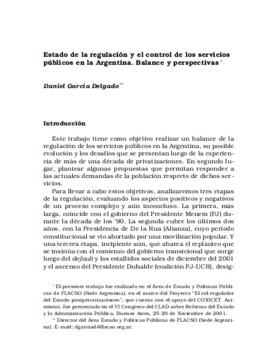Estado de la regulación y el control de los servicios públicos en la Argentina : balance y perspectivas
Status of regulation and control of services public in Argentina : balance and perspectives

Ver/
Fecha
2002-11Autor
García Delgado, DanielResumen
Este trabajo tiene como objetivo realizar un balance de la regulación de los servicios públicos en la Argentina y evaluar los desafíos que se presentan luego de la experiencia de más de una década de privatizaciones. Apunta a destacar las estrategias regulatorias adoptadas por los diferentes gobiernos en el marco de reformas del Estado de primera y segunda generación en tres momentos: el Gobierno de Menem (PJ), el de De la Rua (Alianza), y las tendencias que parecen insinuarse a partir de la crisis argentina (default, estallidos sociales) y el ascenso
de Duhalde (coalición PJ-UCR). La tesis general consiste en mostrar el predominio de los intereses empresarios no solo por sobre los de los ciudadanos-usuarios, sino más significativamente sobre las posibilidades de desarrollo y el logro del bien común. Por último, se señalan –en un contexto inédito tanto por la situación de default como por la existencia de
una economía estancada–, algunas propuestas que permitirían responder a las actuales demandas de la población respecto de dichos servicios. The objective of this work is to take stock of the regulation of public services in Argentina and to assess the challenges that arise after the experience of more than a decade of privatizations. It aims to highlight the regulatory strategies adopted by the different governments in the framework of reforms of the first and second generation State in three moments: the Government of Menem (PJ), that of De la Rua (Alliance), and the tendencies that seem to be insinuated from the Argentine crisis (default, social outbursts) and the rise de Duhalde (coalition PJ-UCR). The general thesis consists of showing the predominance of business interests not only over those of citizen-users, but more significantly about the possibilities of development and the achievement of the common good. Finally, they are pointed out - in an unprecedented context both due to the default situation and the existence of a stagnant economy-, some proposals that would allow responding to the current demands of the population regarding these services.
